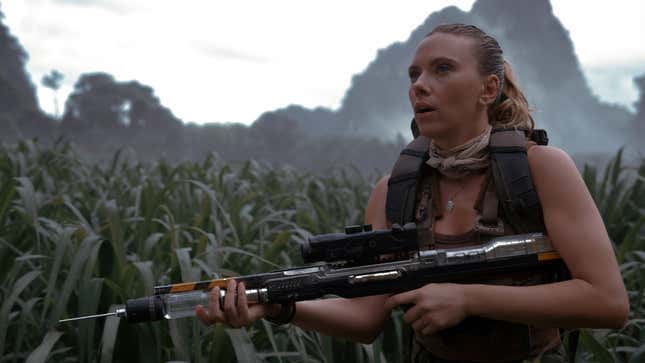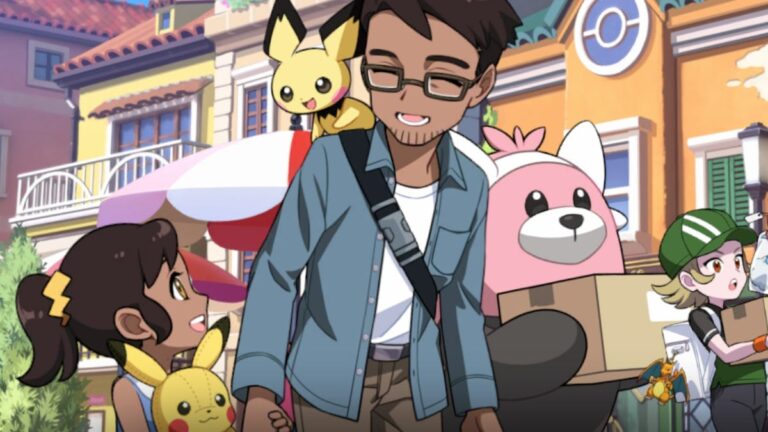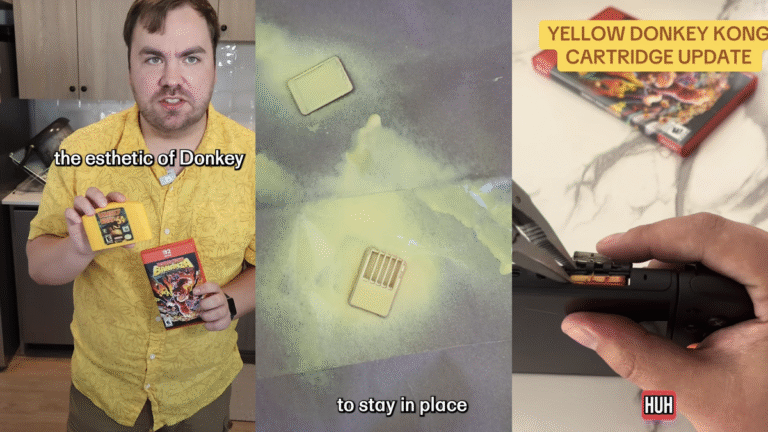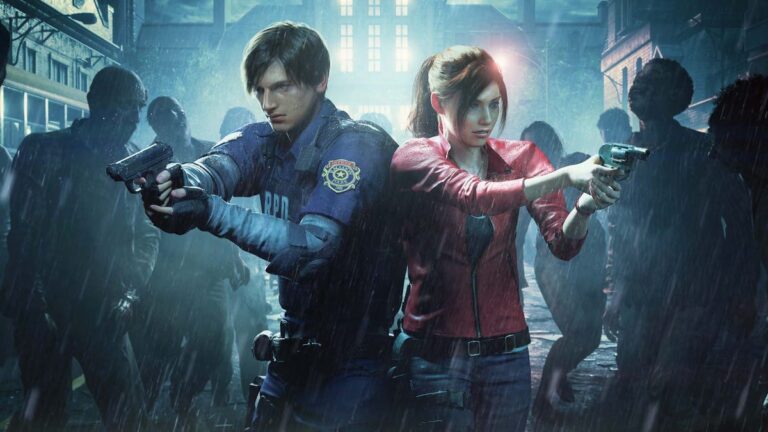
Jurassic World Rebirth’s opening scene is perhaps its strongest. In a flashback sequence set in an experimental dinosaur breeding facility, a carelessly discarded Snickers wrapper gets sucked into a pressure-sealed door, allowing the film’s mutated Distortus Rex to escape its containment, which is technically the genesis of much of the direct horror that follows during the film’s runtime. As I sat in the theater, I could hear the original film’s Dr. Ian Malcom explaining it, while also probably hitting on me, how this is a perfect example of “unpredictability in complex systems, […] the butterfly effect.”
That it was a Snickers wrapper in particular is also notable: An artificial waste product from an artificial food item artificially designed through science to satiate our natural need: “hunger,” as the advertisements always tell us.
Read More: Jurassic World Rebirth Is Half A Good Movie, And Half A Bad Video Game Quest
Rebirth, for much of its runtime, remains in metaphor. It’s concerned with things that we don’t directly say but that have an effect far down the line, burdening our present and returning in our future. It goes on to tell a two-pronged story: A stranded family surviving the impossible and a group of mercenaries undertaking the most video-game-ass plot device I’ve seen in a film in some time. I agree with Kotaku’s Zack Zwiezen in his review that the film is rather clumsy in weaving these two narrative threads together. But interestingly, I’ve found the mercenary side of the story to be more meaningful than my colleague did, and I think it’s key to understanding what’s going on in its ending, which many have found a little hollow by the time the credits hit the screen. Does Rebirth nail what I think it’s trying to do with the mercs? Maybe! But what it’s exploring is rather opposed to the kind of visual, action-heavy spectacle we would expect of an action movie.

This all started to click for me when recalling one particular scene. Early on, when the mercs first encounter the family and find themselves under threat from friggin’ water dinosaurs, Zora Bennett’s (Scarlett Johansson) comrade Duncan Kincaid (Mahershala Ali) snaps into action to do whatever he can to save the lives of the children they just rescued. There’s an element of panic here—chaos—which Zora swiftly addresses by reminding Duncan that he’s not actually emotionally responding to the situation in front of him. Rather, he’s responding to the death of his own child, which we learn about earlier on without much detail. We don’t know much of anything about this event aside from it being a clearly painful life chapter, which Duncan and his off-screen estranged lover have chosen to try and bury in silence, to just abandon like the scientists fleeing the escaped D-Rex in the film’s opening.
Zora herself is burdened by the horrors of the past: We learn she lost someone in a brutal act of violence, leading to a slow, painful death—a traumatic event she’s scarred from having witnessed, it seems, though she never confirms this, and the audience is never shown the act. There’s also her mother, who is said to have died of heart disease, the very thing the characters are trying to cure by securing valuable biological material from dinosaurs. But she rarely, if ever, dwells on them. Neither she nor Duncan get flashbacks to their trauma flashpoint. We hear about it on the margins, lines of dialogue quickly said and discarded to focus on the mission, silent moments of quiet crying when the horrors of the past, mutated into PTSD, have returned to ensnare unclaimed victims.

There’s something admirable about Zora’s demand for Duncan to leave the past alone. It’s clear she’s telling the truth: Panicking over past failures is not helpful when you’re in a boat surrounded by carnivorous dinosaurs. I doubt I’ll ever be in a similar situation. (At least I hope not.) But also, I’d be lying if I said I didn’t tuck that line of hers about emotionally responding to a past event inappropriately in my back pocket for the next time I find myself in some bitter argument that’s really about something wildly different than either party is willing to admit.
But Rebirth isn’t here to tell you a story about the wisdom of bottling up your emotions. Quite the opposite. Duncan gets his opportunity to face that fear and guilt of losing a child vicariously through saving Isabella (Audrina Miranda) by staring down the D-Rex and leading it away from everyone else, to what, for a moment, appears to be his own death.
What Rebirth promises, however, is that directly facing one’s fears isn’t a death sentence. It also makes clear, for the mercs, that the monsters living in our memories are as capable of ensnaring us as the most clever of raptor girls. But Rebirth offers a promise to the emotionally beleaguered mercs: You aren’t guaranteed to be devoured by the mutated horrors of the past if you face them. Bucking the trope of the lone man who faces his fears to his own death, much like Star Wars’ The Last Jedi, Duncan doesn’t become the man who must sacrifice himself to save everyone else. At the same time, his surprise survival also doesn’t indicate that everything’s good now that he stared down a monster; in the final scene of the film, he’s clearly shaken from the events. Three people he and Zora knew were viciously slaughtered in front of them. But the two protagonists are still alive. Survival, as the film reminds us, isn’t guaranteed, but it was still attained by these characters.
This, in my opinion, is what’s leaving some viewers with a sense of hollowness by the film’s ending. A subtle, metaphorically delivered shift in the psyche of the characters isn’t always told through an action film. And to be honest, Rebirth often appears to be actively trying not to be an action film, at least not for the mercenaries (I’d argue the family portrayed in the film’s other plot thread contains more direct action). The mercs’ battle is internal. We see only two scenes where they fire lethal weapons at dinosaurs. There’s no epic dinosaur fight at the end. D-Rex is left on the island to its own devices, with the characters having gone through more of an internal shift in their emotions and personal values as they return to civilization.
The mercenary plotline in Jurassic World Rebirth is a subtle one of internal, emotive transformation and growth. It’s a stark pivot from CGI dinosaurs slamming each other into buildings. It doesn’t always land, but I think if you’re willing to let Zora and Duncan’s arc sit with you a bit more, you might find Rebirth to be a compelling story of human vulnerability, even when the focus isn’t monstrous teeth shredding soft flesh.
.



